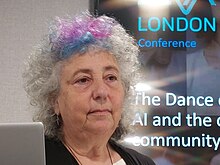Susan Hazan
Susan Hazan | |
|---|---|
 Susan Hazan speaking at the EVA London 2023 Conference | |
| Born | Susan J. Markless 1952 (age 71–72) London, England |
| Nationality | Dual Israeli/British |
| Education | Goldsmiths, University of London |
| Occupation | Museum curator |
| Years active | 1991 onwards |
| Employer | Israel Museum |
| Known for | Head of the Internet Office, Israel Museum; Chair of the Europeana Network Association; Dead Sea Scrolls digital project |
| Notable work | Israel Museum website (1995) |
| Website | museumsphere.com |
Susan Hazan is a museum curator based in Jerusalem, Israel. She has been a curator at the Israel Museum for much of her career and is known for promoting digital aspects of museum access,[1][2][3] especially in the form of virtual museums.[4]
Hazan studied for MA (2000), MPhil (2002), and PhD (2004) degrees at Goldsmiths, University of London,[5] with a thesis entitled Mapping the Musesphere: Cultures of Exhibition and Technologies of Display.[6]
Susan Hazan has been Senior Curator of New Media and Head of the Internet Office at the Israel Museum from 1991 to 2020.[5] In particular, she produced and developed the museum's first website from the mid-1990s.[7][8] She has also been instrumental in a digital project to make the Dead Sea Scrolls accessible more widely around the world in different languages.[9][10][11]
In parallel from 2004, Hazan has led the EVA/MINERA Jerusalem conference series, covering electronic visualisation and the arts.[12] She has also been Chair of the Europeana Network Association during 2021 to 2022,[13] with the aim to make museum collections around Europe accessible online, including the European Commission's New European Bauhaus initiative.[14]
Since 2019, Hazan has been the CEO of Digital Heritage, Israel.[15]
References[edit]
- ^ "Take a Virtual Tour of 30 World-Class Museums & Safely Visit 2 Million Works of Fine Art". Open Culture. 21 March 2020. Retrieved 29 July 2023.
- ^ "Libraries and Museums in an Era of Participatory Culture" (PDF). Washington, D.C.: Institute of Museum and Library Services. October 2011. Retrieved 29 July 2023.
- ^ "פורום נשים בטכנולוגיה - כשטכנולוגיה ואומנות נפגשות" [Forum for women in technology – when technology and art meet] (in Hebrew). Israel Chamber of Information Technology. 15 June 2021. Retrieved 29 July 2023.
- ^ Eglas, Ruth (25 April 2012). "A (virtual) museum visit". The Jerusalem Post. Retrieved 2 August 2023.
- ^ a b "Susan Hazan". Museums and the Web Asia. 2012. Retrieved 29 July 2023.
- ^ "Mapping the Musesphere: Cultures of Exhibition and Technologies of Display". Museosphere. Goldsmiths, University of London. 2004. Retrieved 29 July 2023.
- ^ Sudilovsky, Judith (16 June 2016). "Taking museums into the digital age". The Jerusalem Post. Retrieved 2 August 2023.
- ^ Hazan, S. (1995), "Museums and Art on the Internet", in Bearman, David (ed.), Hands On: Hypermedia & Interactivity in Museums: Selected Papers from the Third International Conference on Hypermedia and Interactivity in Museums, vol. 2 (ICHIM 95/MCN 95), Archives & Museum Informatics, pp. 284–285
- ^ "Свитки Мёртвого моря" [Dead Sea Scrolls] (in Russian). Consulate General of Israel in St. Petersburg. 21 June 2012. Retrieved 29 July 2023.
- ^ Yip, Joan (3 October 2012). "CityU students help on Chinese version of digital Dead Sea Scrolls". City University of Hong Kong. Retrieved 29 July 2023.
- ^ "The Digital Dead Sea Scrolls". China: CCTV. July 2012. Retrieved 29 July 2023.
- ^ Hemsley, James (2013). "The EVA Conference 1990–2012: Personal Reflections". In Bowen, Jonathan P.; Ng, Kia; Keene, Suzanne (eds.). Electronic Visualisation in Arts and Culture. Series on Cultural Computing. Springer. pp. 3–4. doi:10.1007/978-1-4471-5406-8_1. ISBN 978-1-4471-5405-1.
- ^ "Europeana Network Association Annual Report 2021". Europeana. 2021. Retrieved 29 July 2023.
- ^ "New European Bauhaus – an interview with Susan Hazan". Europeana. 2021. Retrieved 29 July 2023.
- ^ "Susan Hazan". About Digital Heritage, Israel. Israel: Digital Heritage. Retrieved 29 July 2023.
